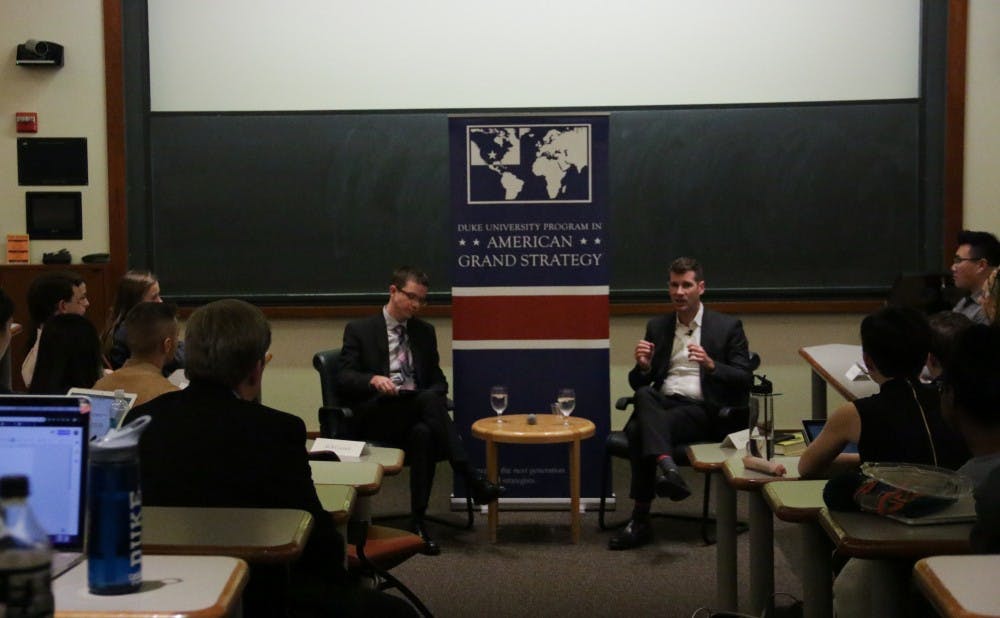Social media has turned into war for attention fought by people from all around the world, a prominent political strategist said at a Monday event.
Peter Singer, a political scientist and strategist for the New America—a Washington, D.C. think tank—and an editor for Popular Science, spoke on his new book "LikeWar: The Weaponization of Social Media" at an event hosted by American Grand Strategy.
“If cyberwar is the hacking of networks, LikeWar is the hacking of people on the networks by driving ideas viral through a mix of likes, lies and network zone algorithms,” Singer said.
The title of the book—"LikeWar"—is a play of words, Singer explained. On the one hand, it indicates that cyberspace—and social media in particular—is not a battlefield in the traditional sense, but still has many common elements with it.
But it also shows that a cyber war is won in amassing attention, usually measured by the clicks or “likes” a post receives.
The Internet is a space that widely diverse groups—ranging from Taylor Swift and her “Swiftees” to the Islamic State—all share with each other, Singer said. These groups actually use similar strategies and tactics, and share very much the same goal: real-world outcomes.
“They are battling against each other for our own attention in a space where attention is power,” Singer said.
Conflicts on social media can influence physical military confrontations, Singer said.
The 2012 Israel-Hamas military conflicts marked what was known as the “first Twitter war,” Singer noted. Both sides posted on platforms such as Twitter, Facebook and Youtube to denounce their opponents and call for support.
There were approximately 10 million posts on Twitter alone, with the vast majority from people outside the region, Singer said.
The 2013 terrorist attack at the Westgate shopping mall in Kenya also drove Singer to study the weaponization of social media.
Before government intervention and local media reporters, the terrorists were the ones reporting online on their attacks and the siege that followed, Singer explained. They thus became the primary source of information for the world.
“Then they began to realize that they didn’t have to tell the truth,” he said. “You get the strange outcome that the terrorist group is controlling the narratives of the world and using them to drive fear more viral…and get a wider victory from the act of terrorism.”
Social media is designed to make profits by using people’s natural instincts such as their personality and psychology, Singer explained. This characteristic of social media dictates narratives, emotion, authenticity, community and inundation as the five most useful tools in this battlefield, according to him in the book.
We as humans make sense of the world by creating stories about everything around us, he added. Therefore, narratives online can easily control people’s minds.
Agents also manage to attract people’s attention online by expressing what Singer called “planned authenticity.”
Those who successfully use this tool recognize a crucial difference of social media from previous communication channels: it operates both on a mass scale and simultaneously allows one-on-one communication, he explained.
“It’s like a combination of telegraph and radio-broadcast and individual communication,” Singer said.
For example, Taylor Swift would read through her fans’ comments on her page and reach down to console someone who has just broken up with her boyfriend or congratulate someone who got a driver’s license—as if she is their friend, he added.
“She is their friend, but she is doing it in full knowledge that the rest of the world is watching,” he said.
Social media is also capable of magnifying the impact of a person or a group, for which ISIS serves as a great example, Singer added.
In the grand scheme of things, ISIS's influence is relatively negligible and minuscule, and its rise has not led to significant shift in global public opinion, he explained. But the fear that it created in the American society was even greater than after 9/11, he said. It also drove concrete policy changes in the United States and generated a ripple effect through, for instance, a discourse on immigration at large.
“The group was skillful at persuading a fairly small number of people to join it but in messaging out wider,” Singer noted.
When it comes to resisting misinformation and enhancing cyber security, every individual has a role to play, he said. Everyone needs to avoid arrogance and ignorance—always stay cautious online and carefully discern the source of every piece of information.
“This responsibility is a little parallel to public health—you need to act that way because if you don’t, you will infect everyone else in your network,” he added.
Gina Yacone, a Durham-based cybersecurity consultant who attended the talk argued when social media becomes a battlefield, it concerns everyone. Her job, for instance, is to design devices to protect data of different companies.
“It may sound crazy in the past that someone could win a war with more information and capabilities to capture people’s attention,” she said. “But it is true in today’s world.”
Get The Chronicle straight to your inbox
Signup for our weekly newsletter. Cancel at any time.

